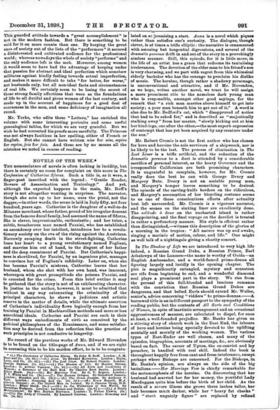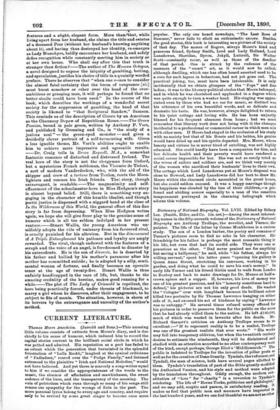NOVELS OF THE WEEK.*
THE nomenclature of novels is often lacking in lucidity, but there is certainly no room for complaint on this score in The Confession of Catherine Sforza. Such a title is, as it were, a finger-post inscribed with the legend : "Gentle Reader, Beware of Assassination and Toxicology." And yet, although the expected happens in the main, Mr. Ruff's story is not altogether wanting in surprises. The narrator, though she acts up to her name, uses the pistol, not the dagger,—in other words, the scene is laid in Italy fifty, not four hundred, years ago. Catherine is the daughter of a well-to-do Milanese merchant, whose father, proud of his irregular descent from the famous ducal family, had assumed the name of Sforza. She is clever, impressionable, enthusiastic ; and her tutor, a subtle, treacherous man named Pazzini, who has established an ascendency over her intellect, introduces her to a revolu- tionary society on the eve of the rising against the Austrians. Narrowly escaping death in the street-fighting, Catherine loses her heart to a young revolutionary named Fogliani, and marries him out of hand, to the disgust of her father and the deep resentment ef Pazzini. But Catherine's happi- ness is slaortlived, for Pazzini, by an ingenious plot, manages to convince her of Fogliani's infidelity. Later on, when she has become Pazzini's mistress, Catherine learns that her husband, whom she shot with her own hand, was innocent, whereupon with great promptitude she noisons Pazzini, and is executed for the crime. From this brief outline it may be gathered that the story is not of an exhilarating character. In justice to the author, however, it must be admitted that without in any way extenuating the criminality of the principal characters, he shows a judicious and artistic reserve in the matter of details, while the ultimate assertion of Catherine's individuality flows logically enough from her training by Pazzini in Machiavellian methods and more or less anarchical ideals. Catherine and Pazzini are each in their different ways embodiments of virtic as conceived by the political philosophers of the Renaissance, and some satisfac- tion may be derived from the reflection that the practice of such principles is not conducive to longevity.
No record of the previous works of Mr. Edward Hovendon is to be found on the title-page of Anna, and if we are right m assuming this to be his maiden effort, he is to be congratu- • (1.) The Confession of Catherine Bforsa. By John B. Ruff. London J. M. Dent and Co. De. 6d.]—(2.) Anna. By Edward Morendon. London : Long, and Co. (Ss. gd.i— (S.) The Lost Liner. By Robert Cromie. London: George Mamma. (3s. 6d.]—(4.) The Shadow of Life. By Marten Strong. London: 0. Arthur Pearson. [2s. 6d.]—(i.) All Sorts and Conditions of WoMisa : a Romance of the Bast Riad. By Charles Bart Banks. London : Elliot Stook. [61.]—(6.) Her Marriage Vow. By O. V. Rogers. London : F. V. White and Co. [65.]—(7.) The Human Octopus. By Gainsford Somers. London. Simpkin and Co. E8s.]—(8.) The Green Passion. By Anthony P. Vert. London, Greening and CO. [33. 6d.)—(9.) Bruce Hornell, M.A. (Locum Tenses)- or, The Oxford Man in Ireland. By J. Duncan Craig, D.C. London : Elliot Stock. [es.]—(10.) In the Wilderness of this World. By Geraldine Hodgson. London: Lawrence and Sullen. [is. 6c1.)—(1l.) A Triple Entanglement. By Mrs. Burton Harrison. London : T. Fisher IInwin. [Gs.] --all The Lady of Cristoold. By Leonard Outran'. London: Greening and Co. Rs. 6(1.1 lated on so 5romising a start. Anna is a novel which piques rather than satisfies one's curiosity. The dialogue, though clever, is at times a trifle elliptic : the narrative is ornamented with amusing but tangential digressions, and several of the dramatis persona drift in and out of the story in a provokingly aimless manner. Still, this episode, for it is little more, in the life of an artist has a grace that redeems its tantalising irrelevances. The devotion of the elder man to his friend's sou is very charming, and we part with regret from this whimsical elderly bachelor who has the courage to proclaim his dislike of music. The heroine, though rather a shadowy personage, is unconventional and attractive, and if Mr. Hovendon, as we hope, writes another novel, we trust he will assign a more prominent role to the nameless dark young man who is responsible, amongst other good sayings, for the remark that "a rich man marries above himself to get into society; a poor man beneath him to get out of it." A word is also due to Mr. Bedford's cat, which "disapproved of notice that had to be asked for," and is described as "majestically stalking away" from her master, "slowly kicking out at him her hind-legs, one after the other,—the most superb expression of contempt that has yet been acquired by any creature under the sun."
Mr. Robert Cromie is not the first author who has chosen for hero and heroine the sole survivors of a shipwreck, nor is he likely to be the last. The process of elimination in The Lost Liner is a trifle artificial, and the reduction of the dramatis personz to a duet is attended by a considerable sacrifice of personal interest, as the heavy Governor and the irresponsible Californian are both promising characters. It is ungrateful to complain, however, for Mr. Cromie really does the best he can with George Drury and Margery Bate. Drury is not an amiable young man, and Margery's temper leaves something to be desired. The episode of the carving-knife borders on the ridiculous, and Margery's assumption of her bicycling costume seems to us one of those conscientious efforts after actuality best left unrecorded. Mr. Cromie is a vigorous narrator, and the scenes on the sinking liner are excellently done. The solitude a deux on the uncharted island is rather disappointing, and the final voyage on the derelict is treated in rather a perfunctory manner. His style is efficient rather than distinguished,—witness this description of the glories of a morning in the tropics : "All nature was up and awake, singing a matinee of motion, colour, and life." One might as well talk of a nightingale giving a charity concert.
In The Shadow of Life we are introduced to very high life indeed, a Russian Grand Duke, a Russian Prince, Earl Athelswyn of the Lancers—the name is worthy of Ouida—an English Ambassador, and a world-famed prima-donna all figuring largely and luridly in the opening chapter. The plot is magnificently entangled, mystery and sensation are rife from beginning to end, and a wonderful diamond seal plays a prominent part in the story. We rise from the perusal of this full-blooded and luscious romance with the conviction that Russian Grand Dukes are dangerous, and that belted Earls should extend Mr. Weller, senior's, advice concerning " vidders " to prima-donnas.—A. borrowed title is an indifferent passport to the sympathy of the reading public, but the contents of All Sorts and Conditions of Women, in spite of inartistic arrangement and an occasional aggressiveness of manner, are calculated to dispel, for once at least, a well-founded prejudice. Mr. Banks has given us a stirring story of church work in the East End, the labours of hero and heroine being specially devoted to the uplifting mentally and morally of the working women. The various types of East-Ender are well chosen, and many of the episodes, biographies, accounts of meetings, Ste., are obviously based on fact. The career of 'Upton, the ex-convict and lay preacher, is handled with real skill. Indeed the book is throughout happily free from cant and from intolerance, except perhaps where Bishops are concerned. For the Bishops, in Mr. Banks's opinion, are always on the side of the big battalions.—Her Marriage Vow is chiefly remarkable for the metamorphosis of the heroine. On discovering that her husband had married her for her money, the youthful Lady Macduggan quits him before the birth of her child. As the result of a severe illness she grows three inches taller, her hair becomes much darker, while her "heavy fat cheeks" and "stout ungainly figure" are replaced by refined features and a slight, elegant form. More thannhat, while living apart from her husband, she claims the title and estates of a deceased Peer (without her husband's knowing anything about it), and having thus destroyed her identity, re-emerges as Lady Blanchyre, boldly encounters her husband, and safely defies recognition while constantly meeting him in society or at her own house. Who shall say after this that truth is stranger than fiction ?—The author of The Human Octopus, a novel designed to expose the iniquity of gambling, betting, and speculation, justifies his choice of title in a quaintly worded preface. There he observes that "when one 0--mes to consider the almost fatal certainty that the boom of vengeance [sic] must burst somehow or other over the head of the over- ambitious or grasping man, it will perhaps be found that no better simile could have been used." In the course of the book, which describes the workings of a wonderful secret society for the suppression of gambling, the head of that society is likened to "that Scriptural Sandow," Samson. This reminds us of the description of Cicero by an American as the Chauncey Depew of Republican Rome.—The Green Passion, bound in pale green, written by Anthony P. Vert, and published by Greening and Co., is "the study of a jealous soul" — the green-eyed monster — and gives a decidedly clever portrait of a self-tormenting wife. Given a less ignoble theme, Mr. Vert's abilities ought to enable him to achieve more impressive and agreeable results. —Dr. Craig tells in Bruce Reyna', M.A., a somewhat fantastic romance of disturbed and distressed Ireland. The real hero of the story is not the clergyman from Oxford, but a mysterious French nobleman, the Vicomte de Tielcat, a. sort of modern Vanderdecken, who, with the aid of the skipper and crew of a tartane from Toulon, routs the Moon- lighters and rescues his Irish friends. The: story, though extravagant, is readable.—The magnanimity and self- effacement of the schoolmaster-hero in Miss Hodgson's story is almost beyond belief. Still, there is something very en- gaging in the character of this humble idealist, and though poetic justice is dispensed with a niggard hand at the close of In the Wilderness of this World, the general effect of this fine story is far from depressing. When Miss Hodgson writes vain, we hope she will give freer play to the genuine sense of humour which is all too seldom indulged in her present venture.—Stuart Wallis, the young American who un- selfishly adopts the role of emissary from his favoured rival, is cruelly punished for his altruism. But in the denouement of A Triple Entanglement his patience and loyalty are amply rewarded. The rival, though endowed with the features of a seraph and the voice of an angel, is foredoomed to disaster by his antecedents. He is the son of divorcée, he is deserted by his father and bullied by his mother's paramour after his mother has committed suicide ; he is adopted by a silly, seiati. mental woman of fortune, and finally becomes an operatic tenor at the age of twenty-five. Stuart Wallis is thus unfairly handicapped in the race of life, but, thanks to the amazing credulity of the heroine, makes good running for a while.—The plot of The Lady of Griswold is repellent, the hero being practically forced, under threats of blackmail, to marry a girl whom he discovers, after their engagement, to be subject to fits of mania. The situation, however, is shorn of its horrors by the extravagance and unreality of the author's method.



































 Previous page
Previous page